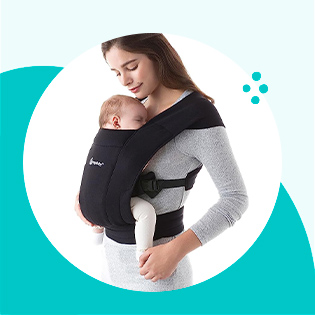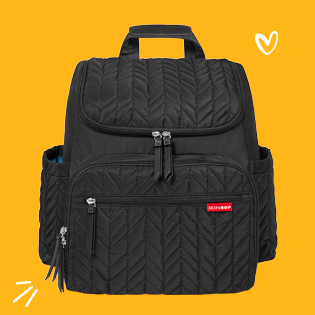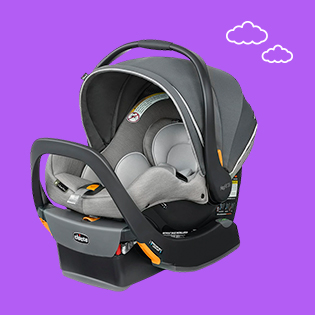There's a new item many moms are adding to their hospital bag checklist: gifts for their labor and delivery providers. These often elaborate gift baskts come packed with everything from personalized notes to energy drinks as a "thank you" to their care team.
"My husband brought two baskets from the car to the nurses' station, letting them know it was a gift for all the staff," says What to Expect mom krysta0894. "Inside the baskets I put a Starbucks mocha bottle, hair tie packs, trail mix and other snacks, Chapstick, gum, candy bars, and mini hand sanitizers."
Other moms and labor and delivery nurses rave about these thoughtful presents on TikTok and in the What to Expect Community, but the trend begs the question: Are these considered nice-to-haves, or are they expected by nurses these days?
- Nearly half (47%) of moms buy gifts for medical staff when they deliver.
- Nurses say that it's absolutely not expected or required, but snacks, cards, and other little gifts are appreciated.
- Of those moms who bring gifts for their labor and delivery team (or who will bring them), they spend $79, on average.
Lots of moms are buying gifts for their delivery staff
Nearly half of moms give gifts to their medical staff for labor, delivery, and postpartum care, per a recent What to Expect survey of 387 women who are currently expecting or have at least one child under age 5. Gen Z moms are more likely to buy these gifts than millennial moms.
A slim majority (53%) still skip bringing presents: "I am not [doing presents], says bumpandacat in her WTE Community birth month group. "I feel like this has just become a 'trend' on social media, so people do it for that. It just feels like another 'to do' when there is already so much preparing going on."
Some of the gifts can get quite expensive: Moms spend or plan to spend $79, on average.
Of the moms who bring them:
35% spend less than $50
36% spend $51 to $100
18% spend $101 to $150
10% spend more than $150
Should moms give gifts to their labor and delivery care team?
Opinions are mixed among moms in the What to Expect Community, with some arguing that it's another task on their near-endless to-do list before the baby arrives, and others saying it's the least they can do for the people who care for them during this momentous event.
“As a nurse, absolutely anything that shows appreciation is adored,” posts WTE mom Jesstephens. “Doesn’t have to be fancy. Nurses don’t really expect anything either, but certainly love it when it happens.”
As a doula for more than 10 years, MaryNissi Lemon of Lemon Life Birthing Services confirms that bringing gifts is not necessarily the norm, based on the nearly 100 births she's attended: "I've only had two families who brought a basket of snacks in the labor room, and a few families who made sure they took down the names of the nurse or nurses who helped them and sent them a gift after birth," she says.
That said, gifting has become more common over the past two years, says Tracy Richards, R.N., B.S.N., R.N.C.-M.N.N., a postpartum nurse at Hoag Hospital in Newport Beach, California — especially among younger Gen-Z moms.
"We never expect it," she explains. "It's always appreciated because all of the hard work sometimes goes unnoticed, like when a mom goes to the bathroom for the first time. For that aide to get a 'thank you' for showing her how to take care of herself, it's the little things that make a big difference. Any gift is wonderful."
If you want to buy nurse gifts, here are some tips
If you're inclined to show your gratitude with a present, there are a number of ways to do it. Keep in mind that some hospitals have rules about outside food or the amount you can spend on each nurse, so check ahead of time; giving cash is usually a no-no.
Get inspired with these ideas from Lemon, Richards, and What to Expect moms.
Snacks, snacks, and more snacks. Nurses often don't get breaks – let alone a lunch break – so easy, on-the-go snacks can be helpful. "We did some individually packaged snacks like fruit leathers and granola bars," says WTE mom Mama-13-AK, who also had a sign on their basket that said "Please take some" and had a group gift for all nurses instead of making numerous individual baskets.
Fresh fruit. "We actually had someone bring in a big tray of fruit, and it was devoured within an hour," Richards says.
Energy and protein boosters. Richards says that Celsius and Alani Nu energy drinks are an increasingly popular "thank you" item and that protein bars are always a solid choice.
Pens and Sharpies. Lots of WTE moms say they throw in pens, Sharpies, and notepads, which are such great, practical gifts that all nurses can use.
Self-care or beauty items. Personal items that you wouldn't normally buy for yourself, like a cute hair tie or bow, are also nice, Richards says: "One mom gave us claw clips — that was a big hit." Gum and lip balm round out the list of small but much-appreciated gifts you can get from your local drugstore.
If the idea of putting together presents stresses you out for monetary or other reasons, it's totally okay to skip it. "I support a diverse variety of families," Lemon says. "Not all families are able to send a gift or bring gifts."
One free way to show your appreciation: "I have had families who express their gratitude by sending a review or even talking to the person in charge while at the hospital," Lemon says.
Juliet Mitchell, an etiquette expert also known as Ms. J, agrees that a personalized review can go a long way.
"In a personalized letter, note, or review, be sure to share specific examples or personal anecdotes of how the individual or team made you feel valued and celebrated," she advises. "Highlighting particular moments and actions that had a positive impact will make your gratitude more heartfelt and meaningful."
Methodology
The What to Expect Talk to Moms® Monthly Poll was conducted by Everyday Health Group – Pregnancy and Parenting between January 28 and 29, 2025. We surveyed 387 U.S. respondents aged 18 to 45 who are currently pregnant or have at least one child up to 5 years old. The survey was fielded among the Dynata Research Panel.


























































































